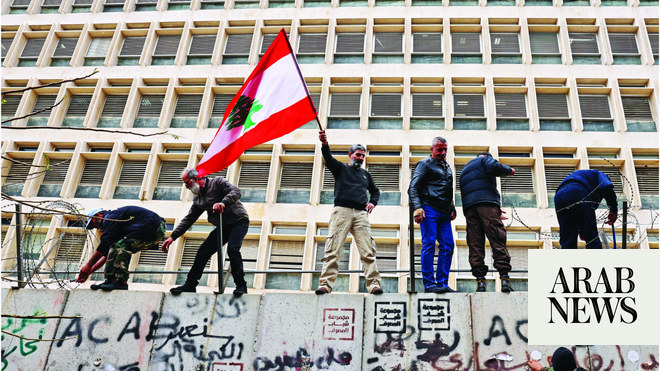
Protesters block Beirut, Tripoli roads as Lebanese government renews plea for international help to resolve Syrian refugee crisis
BEIRUT: Lebanon’s economic meltdown worsened on Monday as protesters blocked roads in Beirut and Tripoli over power cuts and the Banque du Liban’s decision to permanently remove fuel subsidies.
The demonstrations coincided with the Lebanese caretaker government’s renewed call for international efforts to help with the Syrian refugee crisis in the country.
In Qasqas and on Corniche Al-Mazraa, in Beirut, crowds used waste bins to block streets in response to the latest cost-of-living blow.
One protester said: “We can no longer bear this situation. We are dying. There is no electricity, no water, no medicine, and death awaits us near hospital doors because we do not have the means to pay for their services.”
A lack of vital medicines for cancer patients in Lebanon has recently hit the headlines amid a growing crisis in the country’s healthcare sector.
Meanwhile, George Brax, a member of the Syndicate of Gas Station Owners, said: “The central bank completely lifted fuel subsidies on Monday. The gasoline that will be sold at stations is now devoid of any subsidy and will be sold according to the dollar exchange rate on the black market.”
The gas gallon (20-liter) increased by 20,000 Lebanese pounds ($13.18) with the price of one gallon hitting 638,000 pounds, subject to exchange-rate fluctuations.
The Banque du Liban on Monday stopped securing a 20 percent subsidy rate, prompting importers to buy dollars on the black market (at a rate of 36,000 pounds to the dollar) to bring fuel into the country for sale to gas station owners. They had previously been buying dollars according to the central bank’s Sayrafa platform at around 7,000 pounds less than the black-market exchange rate.
Also on Monday, Lebanon’s interior minister urged representatives of Western embassies in the country to “unify efforts and meet the Lebanese authorities’ efforts” to resolve the Syrian refugee situation.
“Neglecting the issue of Syrian refugees may lead to an increase in the hosts’ resentment against the state and a decline in their trust in it and in the Lebanese justice system, as well as the social and psychological consequences that this may have on the hosts,” the minister said.
In a report published on Monday, the Litani River Authority made allegations about breaches of agreements, especially in the Bekaa region, related to trading, the establishment of farms, the raising of livestock, and the opening of shops selling clothes, food, and electronic devices in Syrian refugee camps in Lebanon.
The report noted that what was happening, “contradicts the definition of a refugee in international agreements, is an exception to the provisions of Lebanese laws, and is in contrast to the situation of refugees in various countries.”
The authority called on the Lebanese interior minister, public and internal security forces, and ministers for social affairs, and labor to take appropriate action.
A plan by Lebanese authorities to resolve overcrowding issues and return 15,000 refugees a month to Syria has been rejected by the UN High Commissioner for Refugees agency.
Lebanon’s caretaker prime minister, Najib Mikati, recently sent a letter to the UN Secretary-General Antonio Guterres outlining his concerns over the refugee crisis.
Executive director of the Civic Influence Hub, Ziad Al-Sayegh, said: “What the Lebanese authorities are doing regarding the issue of Syrian refugees is based on populism, and stems from intimidation, incitement, and beggary.”
The official questioned the reasoning behind not “unifying the statistical figures for the number of refugees and classifying Syrian workers and the Syrian refugees,” along with the absence of “inspections for the entry and exit of refugees to Syria.”
He also questioned why “400,000 Syrian refugees had not returned to the Qalamoun, Zabadani, and Al-Qusayr regions,” and what he said was Lebanon’s “refusal to sign a cooperation protocol with the UNHCR, through which they can determine where the refugees came from, where they can return, and what are the paths of their return.”
However, he also blamed the international community’s sluggish response to resolving the crisis.
“What is happening may create tensions between the refugees and the hosts and may endanger Lebanon’s national security,” Al-Sayegh added.










